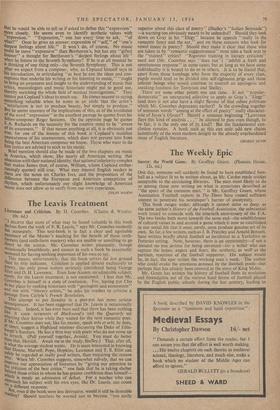The Leavis Treatment
"I BELIEVE that most of what may be found valuable in this book derives from the work of F. R. Leavis," says Mr. Coombes modestly but accurately. This text-book is in fact a clear and agreeable summary of the Master's teaching for the benefit of those sixth- formers (and sixth-form masters) who are unable or unwilling to go direct to the source. Mr. Coombes writes pleasantly, though occasionally breathlessly, and cannot in such a book be reasonably censored for having nothing important of his own to say. This means, unfortunately, that the book covers far less ground than its title indicates. Criticism is applied almost exclusively to poetry, the only prose writers seriously considered being George chut and D. H. Lawrence. Even Jane Austen, an admirable subject, Surely, for the Leavis treatment, is not mentioned. I fear that Mr. Coombes is himself in a state of confusion. For, having put Clio in her place by ranking historians with "geologists and economists" and not with "literary artists," he asks his readers to criticise a passage from Carlyle's French Revolution.
superior about this class of poetry" (Shelley's "Indian Serenade") —a warning too obviously meant to be unheeded? Should they look down on Gray in his "Elegy" because he appeals "really to the romantic fancy and the ear," and on those outcasts who look for vowel music in poetry? Should they make it clear that those who are taken in by "romantic suggestiveness" must take a back seat to the "trained" critics? "Rigorous training in literary criticism" need not (Mr. Coombes says "does not") "inhibit a fresh and spontaneous response" in some cases; but as long as we have some individuality it is bound to do so in others. It is to be feared that, apart from those humbugs who form the majority of every class, pupils would tend to be divided into self-righteous prigs and those inferior beings who would continue to nourish an apologetic and sneaking fondness for Tennyson and Shelley.
There are some other points one can raise. Is not "popular- democratic" an unexpected adjective to apply to Gray's "Elegy" (and does it not also have a slight flavour of that odium politician which Mr. Coombes deprecates earlier)? Is the crowding together of sensuous words -"aiming at the effect of poetry" really character- istic of Joyce's Ulysses? Should a sentence beginning "Lawrence flays this kind of analysis . . ." be allowed to pass even though, to be fair, it is the only one of its kind? But the fundamental con- clusion remains. A book such as this can only add new chains (admittedly of the most modern design) to the already overburdened
muse of English literature.


































 Previous page
Previous page